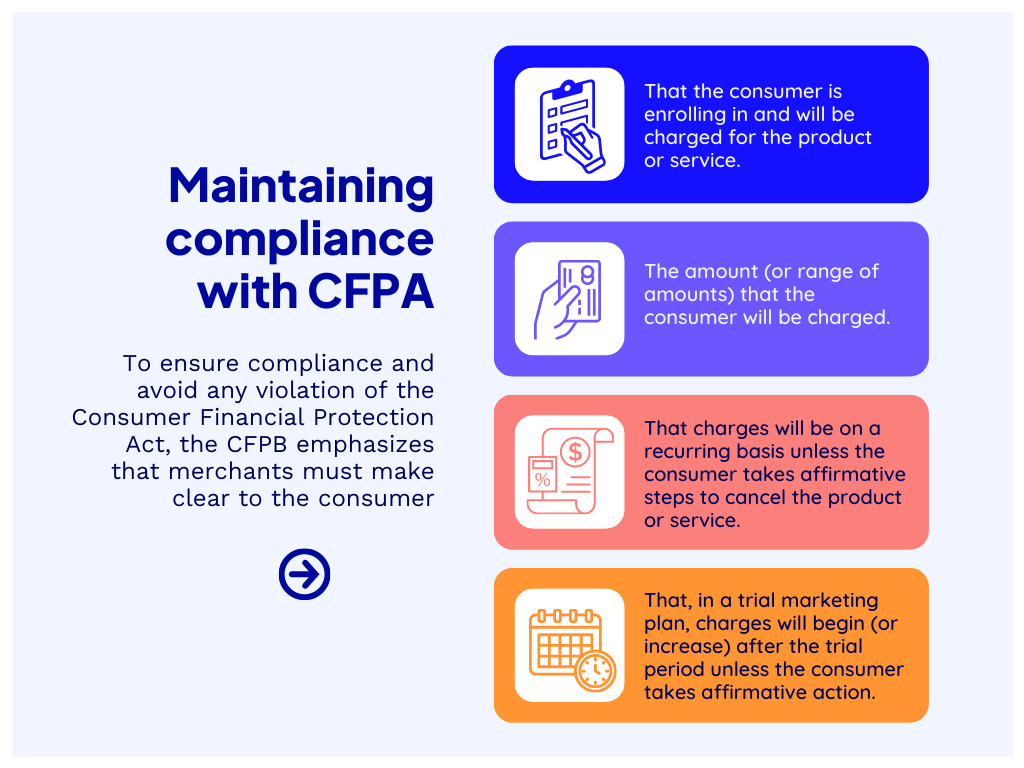The harm caused by dishonest and misleading merchant practices presents a serious problem for the payments ecosystem - causing pain for consumers and payment providers alike. A prominent issue in recent years has been dishonest subscription billing, or “negative option billing” practices. It has become so problematic that the Consumer Financial Protection Bureau (CFPB) made it the focus of the first circular they issued this year.
What is negative option billing (NOB)?
Per the Federal Trade Commission, negative option billing offers refer to a “category of commercial transactions in which sellers interpret a customer’s failure to take an affirmative action, either to reject an offer or cancel an agreement, as assent to be charged for goods and services.”
Problematic negative option merchant practices include, but are not limited to:
- Failure to disclose billing terms
- Making it difficult to contact the merchant to cancel a subscription
- Refusal to allow for cancellation of a subscription at all
- Offering “free trials” which later become expensive monthly fees
When consumers are unable to cancel subscriptions or are charged without their consent, it results in disgruntled consumers, excessive chargebacks, and material harm to the bottom line of payment providers.
Card brands increase their focus on NOB
The issue of problematic negative option merchants has caught the attention of both card brands and regulators.
In 2020, MasterCard estimated that a staggering 60% of all chargebacks were related to recurring billing. In 2021, MasterCard issued new guidance and requirements for negative option merchants, mandating them to clearly state billing terms at the point of payment.
Despite the new card brand requirements, non-compliant negative option merchants continue to be a thorn in the side of the market. This led the Consumer Financial Protection Bureau (CFPB) to issue its first circular of 2023 on the topic of “Unlawful negative option marketing practices”.
The circular examines whether merchants engaging in negative option practices may violate “the prohibition on unfair, deceptive, or abusive acts or practices in the Consumer Financial Protection Act (CFPA).”
The circular identifies negative option practices that may violate the law as situations where a seller:
- “misrepresents or fails to clearly and conspicuously disclose the material terms of a negative option program”
- “fails to obtain consumers’ informed consent”
- “misleads consumers who want to cancel, erects unreasonable barriers to cancellation, or fails to honor cancellation requests that comply with its promised cancellation procedures”
The CFPB stated that it is emphasizing “that covered persons and service providers who engage in negative option marketing are required to comply with the CFPA’s prohibition on unfair, deceptive, and abusive acts or practices [UDAAP].”

With the danger of inadvertently onboarding non-compliant merchants ever present, coupled with the increased attention from regulators like the CFPB and FTC, it is more important than ever that payment providers understand who their merchants are and mitigate the associated risks.
The EverC MerchantView solution can help payment providers mitigate the risks associated with negative option billing and other high-risk merchants.
